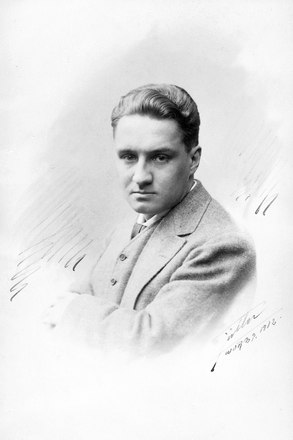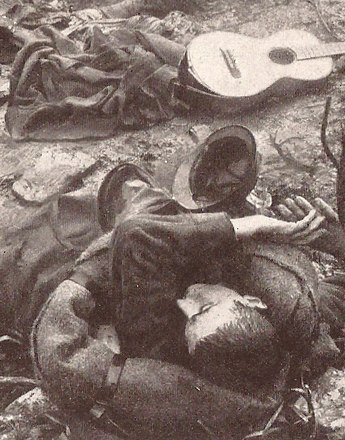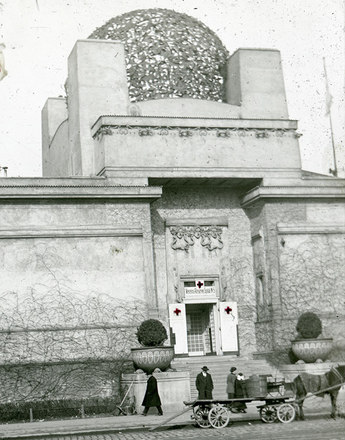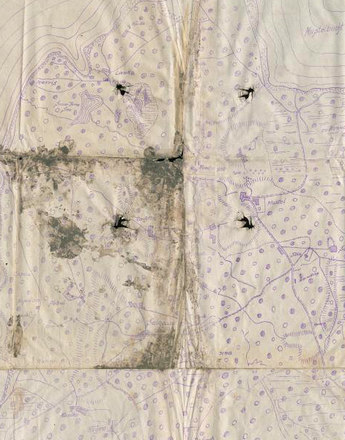Composers’ Fates: War, Death and the Longing for Peace and Overcoming Memories
Even if they were only a tiny minority: the fact that many artistic talents did not live to see the end of the war, because they died on the battlefield, is one that is mostly suppressed. This is particularly true of music. There were others who overcame their wartime experiences in their compositions.
Who has heard of Rudi Stephan (1887–1915), one of the greatest musical hopes in pre-war Germany? He was killed at the age of twenty-eight, a few days after he had arrived at the eastern front in Galicia. The musical material he left was destroyed in 1945 as an effect of the war.
Albéric Magnard (1865–1914), whom many people call the ‘French Bruckner’, died on 3 September 1914, when German soldiers forced their way into his chateau in Baron in Picardy in northern France and, after he had shot at them, set fire to it. He was burned to death and with him the autograph manuscripts of two operas and a song cycle were destroyed.
The Spanish composer Enrique Granados (1867–1916), well-known for his piano suite Goyescas, died in 1916 when the cross-Channel ferry Sussex was torpedoed by a German U-boat in the English Channel. He drowned trying to save his wife from the sea.
Cecil Cole, a Scottish composer born in 1888, was killed by a German soldier in 1918 while attempting to rescue wounded men. He had also continued to compose during the war and had sent the manuscripts to his friend Gustav Holst. Holst, also a composer, survived the war, having been turned down for military service.
Like Holst and Cole, George Butterworth was also a highly talented composer (of the song cycle A Shropshire Lad (1911-12)) and a collector of English folk songs. He fell near Pozières during the Battle of the Somme in 1916, aged 31. His body has never been found. Few of his works have been preserved; he destroyed many of them before he went to the front. Other musicians were luckier: in Austria-Hungary Bela Bartók, Zoltán Kodaly and Bernhard Paumgartner worked far from the front for the Imperial and Royal War Ministry. Walter Braunfels, who composed the opera Die Vögel (The Birds), survived the war as a soldier at the front. His experience of the war turned him into a religious person. The Czech composer Viktor Ullmann, who in the next great war – before being murdered in Auschwitz – wrote the opera Der Kaiser von Atlantis (The Emperor of Atlantis) in the concentration camp at Theresienstadt and set to music Georg Trakl’s poem Herbst (Autumn), survived the First World War as an artillery observer on the Isonzo front.
After the war Ralph Vaughan Williams, a close friend of Butterworth, wrote a wonderfully lyrical symphony, his third, which he called A Pastoral Symphony and in which he tried to ‘restore’ – in musical form, as it were – the soil of the western front which had been wrenched open and abused by the senseless slaughter. ‘It is really a war symphony,’ he later wrote to his wife. The plan to compose the work dates back to the year 1916, when Vaughan Williams himself experienced the battles as a soldier in the British army in the north of France.
Translation: Leigh Bailey
The Life of Ralph Vaughan Williams, in: Ralph Vaughan Williams Society. Unter: http://www.rvwsociety.com (20.06.2014)
Perret, Simon-Pierre/Halbreich, Harry: Albérìc Magnard, Paris 2001
Willaschek, Wolfgang: Leben und Werk Rudi Stephans. Unter: http://www.funkstunde.com/de/musik/rudi-stephan/biographie.html (20.06.2014)
Tonaufnahme "3. Symphonie, 3. Satz (Pastoral Symphony)" Ralph Vaughan Williams. Unter: http://www.youtube.com/watch?v=rl9Jc4ni1yA (20.06.2014)
-
Chapters
- ‘Long jackets instead of Tailcoats’ – The Music Business in Times of Austerity
- Arousing Patriotic Sentiments in the Concert of Nations
- ‘In War the Muses Learn How to Serve’
- Serious Times – Serious Art
- ‘I’d like to dance, I’d like to shout for joy’ – Popular Music in the First World War
- ‘German Musical Life and How to Delouse It’ – Music for Use in the War
- ‘What the soldier in battle dress is singing now will be sung by the entire German people in rare unity.’ – Soldiers’ Songs as Collectors’ Items
- ‘It’s Hugo’s damned duty not to die for the fatherland before I’ve got my Act III.’ – Richard Strauss and the First World War
- Militarism and Terror Set to Music
- ‘La Victoire en chantant’ – The French chanson in the First World War
- Musical Innovations in the First World War
- Composers’ Fates: War, Death and the Longing for Peace and Overcoming Memories
- Star Composers and the Great War




